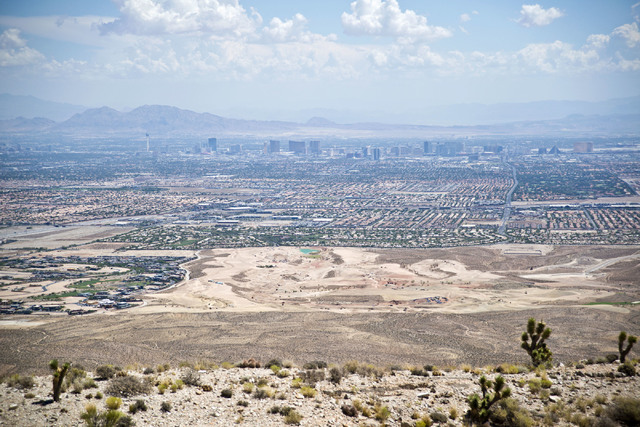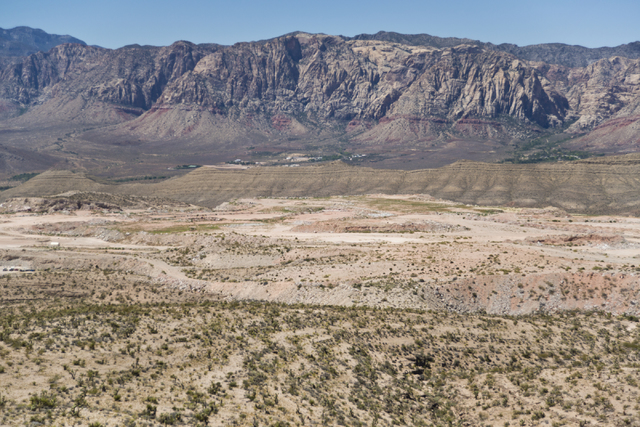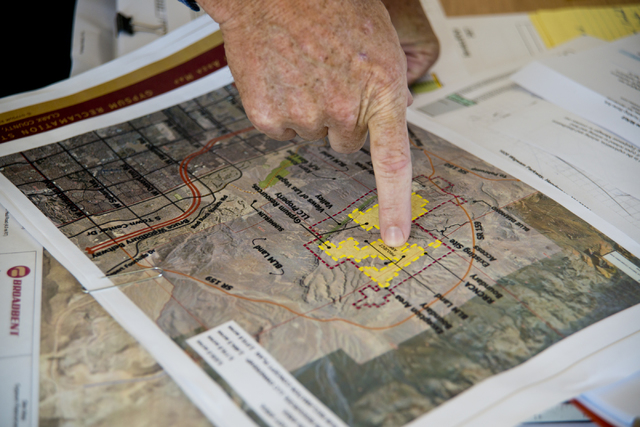Nevada bill would require environmental reports from developers
A bill that would have quashed a developer’s plans to build thousands of homes near Red Rock Canyon was fundamentally changed before being passed out of a committee in the Nevada Assembly.
Assembly Bill 277 will no longer freeze zoning changes on lands inside or within a 5-mile radius of Nevada’s national conservation areas. The bill was amended and passed out of the of the Assembly Government Affairs Committee on Friday on a 14-4 vote, with Al Kramer, Jim Marchant, Richard McArthur and Melissa Woodbury opposed.
The bill would now require developers who want to build inside or within a one-half mile of national conservation areas to create a report detailing how their projects would impact the environment.
Local governments would then have to publicly post the report for at least 15 days, then hold a public hearing to approve or deny the project based, partly, on the report’s findings. The decision could be appealed in District Court.
Environmental impact
AB277 requires developers to pay for the preparation of environmental impact reports, which would examine infrastructure demands, potential adverse impacts on the environment and all reasonable alternatives to the project.
If a state or federal agency has already conducted a review of the project’s environmental impact, that could be used in place of a developer-prepared report.
The initial draft of AB277 would have halted plans by developer Jim Rhodes and mining company Gypsum Resources to build a 5,000-home community on Blue Diamond Hill, which abuts the Red Rock Canyon National Conservation Area.
Rhodes needs a rezoning from Clark County to make his proposal a reality. If AB277 becomes law, Rhodes will have to submit an environmental impact report unless the county approves a development agreement and rezoning for his project before the bill becomes law.
Ron Krater, spokesman for the proposed development, said he was encouraged that the zoning-freeze idea was scrapped. But, he added, AB277 places “an undue burden” on Rhodes’ plan.
“The modifications that were made to the bill on April 14, they make it clear that this legislation targets primarily one land owner,” he said. “It seems to us that this has always been about the Gypsum Resources property.”
Nevada has three national conservation areas: Red Rock Canyon National Conservation Area, Sloan Canyon National Conservation Area, Black Rock-High Rock National Conservation Area.
AB277 would also apply to any future national conservation areas the federal government designates in Nevada. The bill now would not apply to lands within the state’s two national recreation areas.
“Gut and replace”
Kevin Powers, a lawyer for the nonpartisan Legislative Counsel Bureay, testified Friday that the amendment to AB277 was a “gut-and-replace” maneuver.
“It establishes uniform state-wide standards that all local governments must follow before they approve any project within this zone,” he said. “The goal here is to ensure there’s no differences between the local governments and how they approve these projects.”
However, Powers noted, local governments could impose stricter rules and restrictions on development than the bill would require.
The bill’s primary sponsor, Assemblyman Steve Yeager, said he asked for the amendments because the zoning-freeze affected too large an area.
“When you looked at 5 miles from conservation areas you were essentially talking about all of southern Nevada,” said Yeager, D-Las Vegas. “My ultimate goal is to make sure that when it comes to development that is really abutting conservation areas (it) is being done in a responsible manner and taking into account environmental impact and infrastructure.”
Justin Jones, an attorney for environmental nonprofit Save Red Rock, said the amended bill would help protect Nevada’s natural spaces.
“Obviously we would have liked the original bill because it would have likely stopped the project, but we also understand that legislating is hard and it’s a balance between competing interests,” he said. “We feel that Assemblyman Yeager was balancing those interests.”
Contact Michael Scott Davidson at sdavidson@reviewjournal.com or 702-477-3861. Follow @davidsonlvrj on Twitter.
Unconstitutional
The Nevada Supreme Court overturned the last law the Nevada Legislature passed a law blocking development on Blue Diamond Hill.
In 2013 the court ruled that the law violated a provision of the Nevada Constitution that prohibits the Legislature from passing local laws that regulate county business because it specifically targeted Clark County, and the Red Rock area in particular.
Nevada paid developer Jim Rhodes $920,000 in a settlement.
Related
Save Red Rock claims Clark County Commission violated open meeting laws
Controversial plan near Red Rock Canyon gets Clark County Commission OK to proceed
Clark County sues environmental group challenging development on Blue Diamond Hill
Save Red Rock group wants Clark County lawsuit dismissed
Judge will consider Save Red Rock's motion to dismiss lawsuit
Hundreds expected to protest proposed Blue Diamond Hill project


























